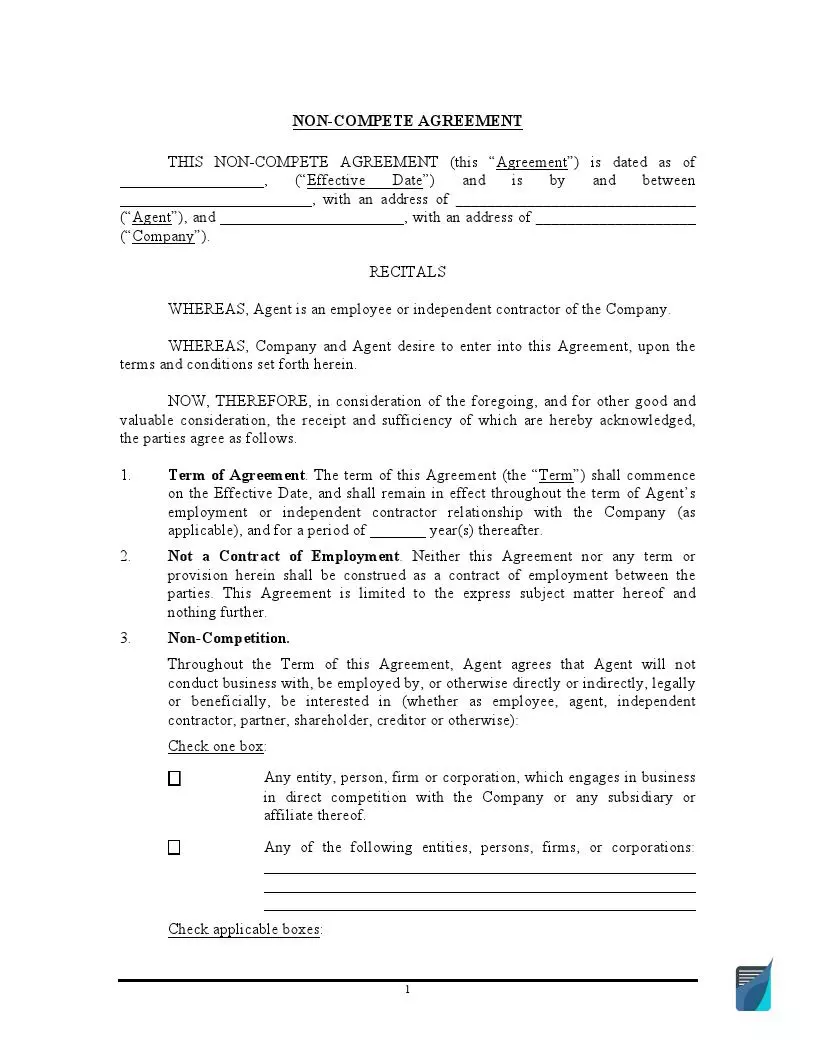Employee Non-Compete Agreement Template
A non-compete agreement between an employer and employee legally blocks an employee from engaging in a competitive business or profession with the employer. It restricts the employee from starting or joining a competitive business. The restrictions can be put in place for a defined period of time or a defined geographical area, or both. It can also be used to prohibit a new joiner from starting a business or profession in rivalry with the employer or joining a competitor after resigning.

Build Your Document
Answer a few simple questions to make your document in minutes
Save and Print
Save progress and finish on any device, download and print anytime
Sign and Use
Your valid, lawyer-approved document is ready
- When to Use?
- The Proper Scope of Non-Compete Restrictions
- Are Non-Compete Agreements Legally Enforceable?
- Is it Required to Agree to a Non-Compete Agreement?
- Can I Reject a Job Applicant if They Refuse to Sign a Non-Compete?
- What Should be Included in the Agreement?
- Pros and Cons of a Non-Compete Agreement
When to Use?
Today, companies have become increasingly dependent on technology, and the sharing of information is possible through the click of a button. A company wouldn’t want an employee to learn all the tricks and secrets of the business, leave the company, and then start a competing business using all the information learned during the employment.
To prevent such a scenario, a business needs non-disclosure and confidentiality agreements and non-compete agreements. Such documents directly prevent an employee from starting or engaging with a competing business for a certain period of time. An employer can use them to:
- Prevent employees from engaging in a competitive business or joining a competitor.
- Prevent employees from using sensitive business information they learned or will learn during their employment.
- Protect trade secrets, customer information, intellectual property, or proprietary formulas from being used as or disclosed to the employer’s competitor.
They can either be used when a new employee is all set to join the employer’s company or is about to resign from his job. They ensure that the employee is legally prohibited for a certain period of time from using trade secrets and sensitive business information that provides a competitive edge.
The Proper Scope of Non-Compete Restrictions
For the non-compete to be enforceable in a court, it mustn’t contain unreasonable or unfair restrictions. For example, if such an agreement restricts an employee for an indefinite period of time, it will be held invalid by the court. Unreasonable restrictions may relate to:
- Time duration
- Geographical restrictions
- Nature of duties restricted
Therefore, it is important to understand the proper scope of these terms when used in a restrictive capacity.
Time Duration
A clause that restricts an employee from engaging in a competitive business for a very long or indefinite period of time will be held invalid. Usually, restrictive clauses that last for longer than two or three years are not considered reasonable. Again, what is reasonable will depend upon state laws and vary with the nature of the business or profession.
Geographical Restrictions
The contract terms relating to geographical restrictions should be reasonable. Restrictions related to a region or a country for which the employee did not work will not be held valid. For example, international restrictions may only be valid if the employee looked after the international operations related to his job. For example, a clause restricting an employee from carrying on a similar business in Asia, while the employer’s business operations are limited to the United States, may not be considered valid. Similarly, a business not having operations on the East Coast may not restrict an employee from carrying on a similar business in that region.
Nature of the Duties Performed
Usually, such agreements can only restrict an employee from performing work similar to what was performed at the employer’s company. For example, a person working in a healthcare company as a Distribution Head may only be restricted from working for another healthcare company in a similar role to use the business information they learned in his previous job. They cannot be restricted from working in another healthcare company altogether in a substantially different role, such as working as a Human Resources Manager in another healthcare company.
Are Non-Compete Agreements Legally Enforceable?
These agreements are legally acceptable in most states except a few. California, North Dakota, Montana, Oklahoma completely ban employee such restrictive agreements. However, state laws regarding the validity of an agreement vary depending on the restrictive time period terms, geographical restrictions and risk posed to the employer considering the nature of the job or business.
For example, a highly innovative company spending a lot of time and money on research and development for its specialized products and services will have better chances at enforcing non-compete agreements against their employees. On the other hand, a clothing shop restricting an employee from setting up their own clothing business might not be successful in enforcing such a contract against its employee. Further, as explained above, these agreements should not have long or indefinite time restrictions, unreasonable geographical restrictions, or restrictions on jobs of a completely different nature.
Is it Required to Agree to a Non-Compete Agreement?
Usually, employers only provide a job contingent for the signing of a non-compete. In such a case, the employee has full rights to go through the restrictive terms in the contract and obtain legal consultation. If the restrictions are unreasonable, an employee can either reject the offer or bargain with the employer for an increment or higher pay. It is not necessary to agree to a non-compete; however, in that case, the employer may not provide the job.
Can I Reject a Job Applicant if They Refuse to Sign a Non-Compete?
A company has full rights to make a job offer contingent on the signing of a non-compete. The only thing an employer should keep in mind is to have reasonable and precise restrictions in the agreement.
What Should be Included in the Agreement?
The following terms should be included in a non-compete agreement:
Employer and the Employee Information
The full name of the employer’s business and the employee and their address should be mentioned in the agreement.
Effective Date
This is the date from which the non-compete restrictions will apply to the employee. When the agreement is to be signed by a new joiner, the effective date can be the date of his joining. When the agreement is to be signed by an employee who is about to leave, it can be their employment termination date. The effective date is not the same as the signing date. The agreement is usually signed at an earlier date than the effective date.
Duration of the Non-Compete
These are specific dates during which the employee will be barred from carrying on or joining a competitive business. For a former employee, it usually begins from the effective date and lasts for a few months or up to two or three years after leaving, depending on state laws. For a current employee, it may continue during the entire term of employment plus a few months or up to two or three years after leaving the job.
Geographical Area Covered
The geographical area within which the employee will be prohibited from carrying on or joining a competitive business should be mentioned. The country or region should be specified. Unreasonable restrictions to not work in an area where the employer does not have a business are usually not considered valid.
Reasons for the Non-Compete
A non-compete bans an employee from making a living for a certain period from a particular job function. Therefore, the justification behind having such a clause should be mentioned. For example, where a company has spent years developing a product and incurred high R&D costs, such reasons justify putting restrictive clauses in the agreement and should be mentioned in the agreement.
Type of Work Restricted
This will usually contain the job duties that the employee was performing or will perform. For example, a Client Relationship Head would be prohibited from working in a similar role with a competitor where he or she could use all the client information to build up the competitor’s business.
Compensation
The job and salary of a current employee are considered adequate compensation for signing a non-compete. However, sometimes, for a former employee who was not bound by a non-compete at the time of signing, the employer may agree to provide a fixed lumpsum amount or a monthly fee for agreeing to sign the restrictive contract. In the case of a new employee, it is essential to mention the duration of restrictive restrictions that will apply to them after they leave the job. Otherwise, the employee may ask for additional compensation at the time of leaving for agreeing to such terms.
Governing Law
It is crucial to choose the correct governing law regarding a non-compete agreement. A few states completely disallow them, and some states may only enforce them in a very limited manner.
Pros and Cons of a Non-Compete Agreement
Today, it has become a standard practice for employers to use non-compete agreements while hiring employees. They have different consequences from an employee’s perspective when compared to an employer’s perspective.
Employer’s Perspective
From an employer’s perspective, it provides the following benefits:
- It protects competitive and sensitive business information.
- It protects trade secrets and proprietary information that may be a result of many years of hard work.
- It reduces an employee’s motivation to change jobs and increase employee retention rate.
However, sometimes, employers may need to provide costly training to such employees to teach them the specialized skills needed for the job. Further, it might be difficult to find employees who will agree to such restrictive contracts.
Employee’s Perspective
It may give the employee a chance to demand higher pay, an increment, or a promotion. Further, such jobs usually have high growth and learning opportunities. However, it may cause an employee to leave an area of work completely, and their related expertise may go to waste. Further, while changing jobs, an employee may have limited employment options to choose from that don’t compete with their former employer.
